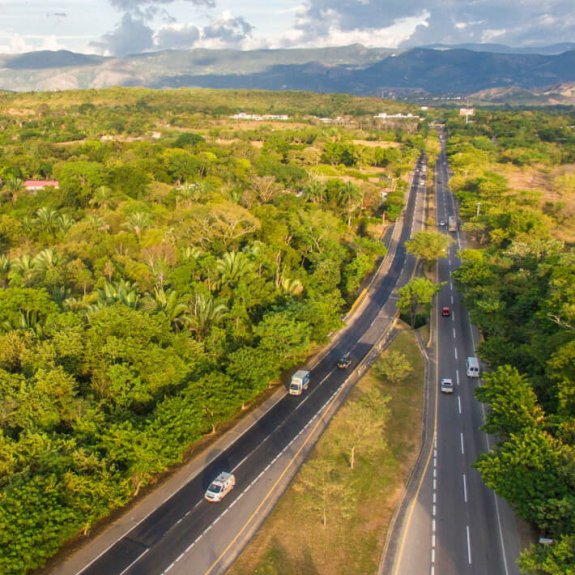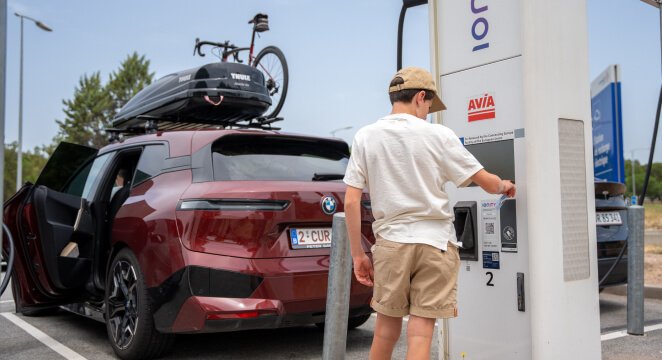
Acting for the climate
Learn about all of our objectives and actions to reduce our direct and indirect greenhouse gas emissions.
With its low-carbon motorway project, VINCI Autoroutes is helping to reduce emissions associated with road travel. This project involves developing, in partnership with local stakeholders, infrastructure, equipment and services to promote the decarbonisation of vehicles (charging infrastructure, hydrogen and biogas stations, etc.), the densification of shared modes (carpooling carparks, dedicated lanes for coach routes, etc.) and the interconnection of transport modes (multimodal park-and-ride facilities).

Quick access
In France, in 2022, transport was responsible for approximately 32% of national greenhouse gas emissions. Road transport alone accounted for almost 94% of transport-related emissions. Reducing emissions from this sector is therefore a key issue for the ecological transition. Based on this observation, VINCI Autoroutes developed its Low-Carbon Motorway project and began converting its light-duty vehicles to electric.
Since 2022, five Low-Carbon Motorway agreements have already been signed in France with the Sud Region, Tours Métropole, the Auvergne-Rhône-Alpes Region, the Basque Country Urban Community & the Basque Country-Adour Mobility Union, as well as Nouvelle-Aquitaine Mobilités. What is the objective of these agreements? To develop alternative and low-carbon mobility on the major motorway routes in these regions, such as electromobility or carpooling.
In 2024, 75% of VINCI Autoroutes’ light-duty vehicles were electric. By 2030, the objective is to convert 85% of its fleet to electric and 15% to plug-in hybrid or biofuel vehicles.
5
Low-Carbon Highway Agreements signed in France with local authorities and stakeholders since 2022.
75%
of VINCI Autoroutes’ light-duty vehicles were converted to electric in 2024.

With 100% of the service areas in the VINCI Autoroutes network equipped with recharging terminals, we are helping to accelerate the transition of uses and reduce greenhouse gas emissions linked to road travel.
This systematic networking of routes goes hand-in-hand with the design of connected services, making “seamless” electromobility possible. The Ulys application enables more than 6.8 million subscribers to geolocate 62,000 electric recharging terminals throughout France and offers a universal cashless payment functionality to “fill up with electric” at all types of stations.
100%
of service areas equipped with electric recharging terminals
59
carpooling car parks in service in 2024
Finally, VINCI Autoroutes is providing motorway users with a subscription offer dedicated to carpooling in partnership with BlaBlaCar, a community platform that connects drivers and passengers wishing to share a car journey and the associated costs. This subscription is available via the Ulys application. VINCI Autoroutes also offers car parks at the entrances and exits of its network: in 2024, 59 car parks were in service, providing a total of more than 5,000 spaces. These figures are set to double in the coming years since, because as part of the Motorway Investment Plan launched in 2019, VINCI Autoroutes plans to devote €16 million to the creation of around forty additional car parks.
Furthermore, new-generation infrastructures, such as the multimodal park in Longvilliers, 45 km southwest of Paris, combine carpooling services with other mobility solutions, such as express coach lanes on the motorway. The objective? To offer a comprehensive low-carbon mobility offer to residents of the areas served by the network.
By signing these Low-Carbon Motorway agreements and developing infrastructure and services that promote low-carbon mobility, VINCI Autoroutes is helping to reduce emissions from the road transport sector.

Acting for the climate
Learn about all of our objectives and actions to reduce our direct and indirect greenhouse gas emissions.